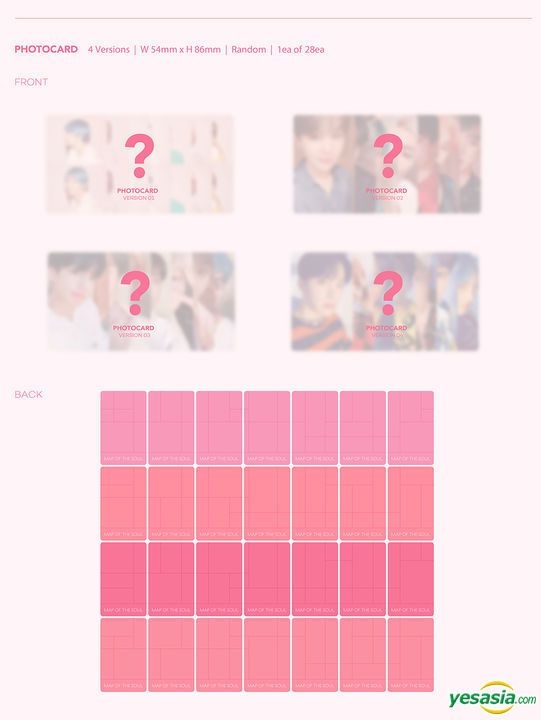Unpacking the Layers: A Comprehensive Exploration of BTS’ "Map of the Soul: Persona" Versions
Related Articles: Unpacking the Layers: A Comprehensive Exploration of BTS’ "Map of the Soul: Persona" Versions
Introduction
With great pleasure, we will explore the intriguing topic related to Unpacking the Layers: A Comprehensive Exploration of BTS’ "Map of the Soul: Persona" Versions. Let’s weave interesting information and offer fresh perspectives to the readers.
Table of Content
Unpacking the Layers: A Comprehensive Exploration of BTS’ "Map of the Soul: Persona" Versions

BTS’ "Map of the Soul: Persona" marked a significant milestone in the group’s musical journey, exploring themes of identity, self-discovery, and the complexities of navigating the world. Released in April 2019, the album’s impact extended beyond its musicality, with its multiple versions captivating fans and showcasing a meticulous attention to detail.
The "Map of the Soul: Persona" Versions: A Detailed Look
The album was released in four versions: Version 1 (Persona), Version 2 (Shadow), Version 3 (Ego), and Version 4 (Answer). Each version offered a distinct visual and thematic approach, adding layers to the overall narrative.
Version 1: Persona
This version embodies the central theme of the album – the "Persona," the public face we present to the world. The vibrant color palette, featuring bold blues, reds, and yellows, reflects the outward projection of self. The packaging features a dynamic, energetic design, mirroring the album’s title track, "Persona," which explores the concept of embracing one’s true self.
Version 2: Shadow
"Shadow" delves into the darker, hidden aspects of the self, the parts we often try to suppress. The version’s aesthetic reflects this, featuring a darker color scheme with hints of purple and black. The packaging, with its intricate patterns and shadowed imagery, creates a sense of mystery and intrigue, reflecting the album’s exploration of the subconscious.
Version 3: Ego
"Ego" represents the culmination of the journey, the integration of the "Persona" and "Shadow," leading to a more complete understanding of oneself. The version’s visual identity is characterized by a more balanced color palette, with a focus on earthy tones and a sense of calm. The packaging, featuring a more minimalist design, symbolizes the acceptance and integration of the different aspects of the self.
Version 4: Answer
"Answer" serves as the final chapter, offering a reflection on the journey of self-discovery. The version’s visual identity is characterized by a sense of closure and completion. The packaging features a more refined design, incorporating elements from the previous versions, signifying the integration of the "Persona," "Shadow," and "Ego" into a cohesive whole.
The Significance of the Versions
Beyond their aesthetic appeal, the multiple versions of "Map of the Soul: Persona" are significant for several reasons:
- Narrative Depth: Each version contributes to a deeper understanding of the album’s overarching narrative, providing a multifaceted perspective on the journey of self-discovery.
- Fan Engagement: The different versions encourage fans to explore the album from various angles, fostering a sense of community and engagement.
- Artistic Expression: The multiple versions showcase the artistic vision of the group, demonstrating their meticulous attention to detail and their commitment to creating a cohesive and impactful artistic experience.
FAQs about "Map of the Soul: Persona" Versions
Q: Which version should I buy?
A: The best version for you depends on your individual preferences. If you prefer a vibrant and energetic aesthetic, "Persona" might be the best choice. For those drawn to a darker, more introspective approach, "Shadow" could be more appealing. "Ego" offers a more balanced and contemplative experience, while "Answer" provides a sense of closure and completion.
Q: Do the different versions have different music?
A: All versions of "Map of the Soul: Persona" feature the same core tracklist. However, the versions may include different bonus tracks or special features, such as photo cards or posters.
Q: What are the differences in the packaging?
A: Each version features unique packaging designs, with different color palettes, imagery, and layout. The "Persona" version features a dynamic and energetic design, while "Shadow" has a darker and more intricate aesthetic. "Ego" has a more minimalist design, while "Answer" incorporates elements from the previous versions.
Q: Are the versions limited edition?
A: The "Map of the Soul: Persona" versions are not limited edition. However, certain versions may be harder to find or may be sold out in specific regions.
Tips for Choosing the Right Version
- Consider your aesthetic preferences: Do you prefer vibrant colors or darker tones?
- Think about the album’s themes: Which version resonates most with your understanding of the album’s narrative?
- Research the bonus content: Some versions may include unique photo cards, posters, or other special features.
- Check online retailers for availability: Certain versions may be harder to find or may be sold out in specific regions.
Conclusion
The multiple versions of "Map of the Soul: Persona" represent a testament to BTS’ commitment to artistic depth and fan engagement. By offering distinct visual and thematic experiences, the versions encourage a deeper understanding of the album’s narrative and foster a sense of community among fans. Whether you choose the vibrant "Persona" or the introspective "Shadow," each version offers a unique window into the intricate world of BTS’ musical and artistic vision.





![BTS - MAP OF THE SOUL : PERSONA - VERSION [1] - SPECIAL ALBUM](https://cdn.webshopapp.com/shops/256829/files/269471524/600x600x2/bts-map-of-the-soul-persona-version-1-special-albu.jpg)
![BTS (방탄소년단) MAP of the SOUL:PERSONA [UNBOXING] 4 Versions #bts #](https://i.ytimg.com/vi/7HLcjy6brHs/maxresdefault.jpg)

Closure
Thus, we hope this article has provided valuable insights into Unpacking the Layers: A Comprehensive Exploration of BTS’ "Map of the Soul: Persona" Versions. We appreciate your attention to our article. See you in our next article!